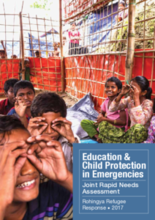Objectives
Cox’s Bazar Education Sector and Child Protection Sub-Sector partners conducted the Joint Rapid Education and Child Protection Need Assessment (JRNA) between the 4th to 6th December 2017. The main objective of the JRNA was to identify education and child protection needs, priorities and capacities of Rohingya boys and girls in the camps, settlements and host community in Cox’s Bazar, Bangladesh to inform and provide the evidence-base for the 2018 Joint Response Plan (JRP). The assessment was based on the agreed common approach by the Global Protection Cluster and Global Education Cluster of One vision: Four solutions. The vision: Boys and girls living in emergencies have equitable access to quality education and grow up free from abuse, neglect, exploitation and violence.
Purpose of the report
This report has been prepared based on the findings of the JRNA. It is specifically designed for the attention of government, humanitarian actors and donors and calls for their action to respond to the needs and capacities of Rohingya and host community girls and boys.
The report presents key findings from the assessment as well as recommendations for government and other actors. Child Protection-related findings include data on the risks and safety of Rohingya refugee children (including family separation), unaccompanied and separated children, violence against children, and child marriage and trafficking, among other concerns.

